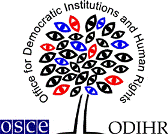OSCE/ODIHR

Education and capacity building activities are one of the main pillars of ODIHR’s work. Information about these areas, references to concrete educational tools as well as contact details of relevant ODIHR staff members are included below.
Work areas
Area 1. Promoting Holocaust remembrance and educational approaches to combat anti-Semitism
- Teaching materials to combat anti-Semitism, for secondary schools
- Guidelines on How and Why to Address Anti-Semitism
- Study Education on the Holocaust and on Anti-Semitism: An Overview and Analysis of Educational Approaches
- Guidelines on Preparing Holocaust Memorial Days – Suggestions for Educators
- Holocaust Memorial Days in the OSCE Region, an overview of governmental practices
Contact point: Anne Giebel, Tolerance and Non-Discrimination Department
Area 2. Promoting educational approaches to Intolerance and Discrimination against Muslims
- Guidelines for Educators on Countering Intolerance and Discrimination against Muslims: Addressing Islamophobia through Education (with the Council of Europe and UNESCO)
Contact point: Marouane Mohamed, Tolerance and Non-Discrimination Department
Area 3. Supporting the governments and civil society to implement quality human rights education in formal and non-formal education
- Human Rights Education in the School Systems of Europe, Central Asia and North America: a Compendium of Good Practice (with Council of Europe, UNESCO, OHCHR, HREA)
- Guidelines on Human Rights Education for Secondary School Systems
- Guidelines on Human Rights Education for Law Enforcement Officials
- Guidelines on Human Rights Education for Human Rights Activists
- Guidelines on Human Rights Education for Health Workers
- Manual “Teaching Human Rights in School and Beyond” (for Belarus)
- Handbook “Protecting and promoting human rights through civic participation” (for Belarus)
Contact point: Pavel Chacuk, Human Rights Department
Area 4. Education on Roma and Sinti Issues
- Website (joint, with Council of Europe) dedicated to awareness raising and teaching about the Roma genocide Roma Genocide / Le génocide des Roms
- Book and CD on “Police and Roma and Sinti: Good Practices in Building Trust and Understanding” (with OSCE’s Strategic Police Matters Unit)
- Video “We want to be heard – Roma and Sinti in the OSCE region” by ROMEDIA with the support of ODIHR CPRSI.
- Report Mapping the participation of Roma and Sinti in early education processes within the OSCE region.
Contact point: Mirjam Karoly, Contact Point for Roma and Sinti Issues or roma@odihr.pl
Area 5. Trial Monitoring Training
ODIHR has developed a reference manual for trial-monitoring practitioners as well as a Legal Digest of International Fair trial Rights as an educational tool for civil society to support trial monitoring. On the basis of these tools, ODIHR offers a training programme on trial monitoring methodology to interested NGOs.
- Trial Monitoring: A Reference Manual for Practitioners, 2012 Edition
- Legal Digest of International Fair Trial Rights
Contact point: Tina Gewis, Chief of Rule of Law Unit
Area 6. Training to Support to Civil Society
ODIHR works to strengthen the capacity of civil society by increasing dialogue and co-operation with state authorities, in such areas as Democratic governance, Migration and Freedom of movement, and the Rule of law.
Contact points: Marcin Walecki, Chief of Democratic Governance Unit., Nathalie Tagwerker (for Migration and Freedom of movement issues) and Tina Gewis (for Rule of Law issues)
ODIHR also builds the capacity of the civil society to work in human rights, particularly on human rights monitoring and reporting, human rights advocacy as well as thematic areas such as anti-torture, freedom of assembly and association, etc.
Contact point: Pavel Chacuk, Human Rights Department
Area 7. Promoting Women’s Political Participation and Gender Equality
ODIHR works to compile and share best practices with respect to voluntary measures that have been successful in promoting women’s involvement in political parties. Trends in women’s participation in politics are outlined in the baseline study Gender Equality in Elected Office: A Six-Step Action Plan.
ODIHR supports networking between women's groups and political stakeholders and trains legislators, women leaders and civil society on measures to promote women’s political participation.
Contact point: Ajla Vanheel, ODIHR Gender Adviser.
Area 8. Training and Resources to Support Security Sector Actors in Reform Efforts
- Gender and Security Sector Reform Toolkit
- Guidance Notes on Gender in Security Sector Oversight
- Handbook on Human Rights and Fundamental Freedoms of Armed Forces Personnel
Contact point: Oyvind Hoyen, ODIHR Human Rights Officer.
Area 9. Protecting Human Rights while countering terrorism
ODIHR has developed guidebooks and manuals which provide law enforcement officials with a better understanding of the main human rights issues that arise while addressing terrorism and ways to ensure the protection of human rights in line with international standards and OSCE commitments:
- Countering Terrorism, Protecting Human Rights
- Preventing Terrorism and Countering Violent Extremism and Radicalization that Lead to Terrorism: A Community-Policing Approach
- Human Rights in Counter-Terrorism Investigations: A Practical Manual for Law Enforcement Officers
Contact point: Fraser Hirst, ODIHR Adviser on Anti-Terrorism Issues.
Area 10. Online database
ODIHR has created an online legal database called Legislationline as an educational resource for legal practitioners and civil society, providing direct access to international norms and standards relating to specific human dimension issues, as well as to the domestic legislation of OSCE participating States.
Contact point: Agata Rzewuska, Website Assistant.
AssociatiOnline is an interactive guide to freedom of association for government authorities and civil society. It can be used for educational purposes, providing direct access to key principles and international standards relating to freedom of association, with a special focus on NGOs.
Contact point: Anita Danka, Human Rights Department.


